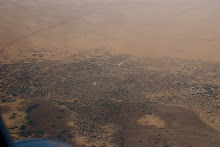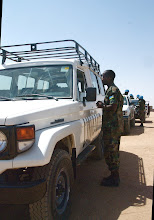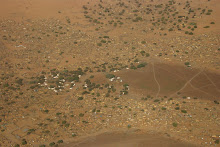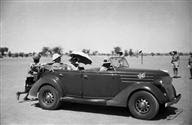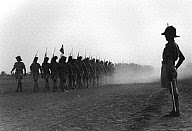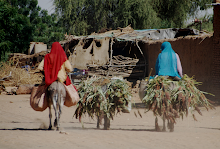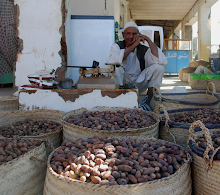Mohammed poked at the dry lump of rice on his plate which had been offered as lunch by the Nigerian contingent - “They can’t even cook food to eat, how do you think they are going to protect a community?” he asks. We are staying at a ‘teamsite’ – the small bases that are the AU-UN peacekeeping mission’s only presence in Darfur outside of the three regional capitals. Each houses about 150 military and 100 police who monitor armed movements and conduct daily patrols around the community.
Mohammed, who is from a minority tribe in Darfur, sees power politics clearly, with no comforting allusions. It has been a disheartening day and the lack of edible food is a good indicator of the difficulties faced by peacekeepers – impossible supply chains, low morale, and an uneasy relationship with the local community.
Landing here, you think the helicopter pilot has made a mistake. The first sign of life is a solitary soldier guarding the rocky landing spot, and behind him emerges the barbed wire and sand bladder cage representing an airport. Once you descend squinting into the harsh light you start to see subtle texture to the rocky landscape that is vegetation, crumbling houses and a donkey or two.
Kutum sits on the side of a dry river bed along a major nomadic route from Lybia to the Central African Republic and used to be a trading center of some fame (Wilfred Thesiger was stationed here as a young British Colonial Officer). Its centrality has also made it one of the epicenters of violence in the Darfur conflict with a long and twisting history of attacks.
The town is flanked by two huge displaced person camps – refugees from the battle waged between Government and rebel groups for control of their lands. The camps are in turn flanked by armed militia and camp inhabitants venturing out to plant crops or gather firewood are periodically harassed – assaulted, beaten, shot at, crops trampled and donkeys stolen. Although rumors of impending attacks are flying through town– after decades of instability the residents are good at predicting battles - the most immediate problem seems to be the crime and impunity which prevents (by design or not) people from going about their livelihoods.
'
The first stop on a patrol with the UN peacekeepers is the GoS (Government of Sudan) Police station. UNAMID's mandate does not allow for the investigation of crimes or arrest of perpetrators - it is limited to the ‘protection of civilians under imminent threat’ ie. intervention either immediately prior to or during the criminal act. In cases where a crime has been reported after the fact, UNAMID's soldiers, police, and civilians can only pressure the government to fulfill its duty in investigating the crimes. And, though the GoS police’s motivation to investigate may be questionable, their ability is not. The perpetrators are both better armed and better connected. Heavily armed and turbaned men hovering around the police station listening to every word, press this point.
In the past, in line with traditions that allowed for the governing of immense inhospitable terrain, the police would call the leaders of a suspect's tribe to come account for his or her crime. But the old guard no longer has control, and showing up at the police station to admit it would be both humiliating and dangerous. Guns and salaries offered by the government have bent the loyalties of the tribes’ youth and destroyed the authority of their elders.
Exactly which guns and salaries are giving to which militia by the government is debatable, but few dispute that the GoS - having come to power in a coup - recognizes the danger of a military and is hedging its bets by supporting at least a few distinct armed groups. A result which Mohammed sums up as putting the entire town at the mercy of 13 year olds smoking marijuana in the bush waiting for orders on their satellite phones.
Residents are understandably frustrated that the relatively well-equipped peacekeepers can do little to improve their day-to-day situation. They complain that when the African Union mission turned over to the AU-UN mission, the soldiers only changed their hats – in truth, in many cases the soldiers only painted their old helmets blue. But the problem is not the quality of the peacekeepers; it is that of the mandate.
The mission may be successful in peace negotiations with its current mandate to protect civilians under threat of attack, but if it wants to make an immediate difference in the lives of civilians it needs to address crime.
The issue is hugely complicated – the power to arrest could, in a worst case scenario, make the UN a party to the conflict. And in a better case scenario, put the UN in the awkward position of choosing to dispense ‘international’ justice on an unwilling population or handing suspects over to either government or rebel forces that would likely kill them. But the purpose of a peacekeeping mission is to protect civilians, and if the threat to civilians is evolving, so must the mandate of the mission.
Friday, November 7, 2008
Subscribe to:
Posts (Atom)

